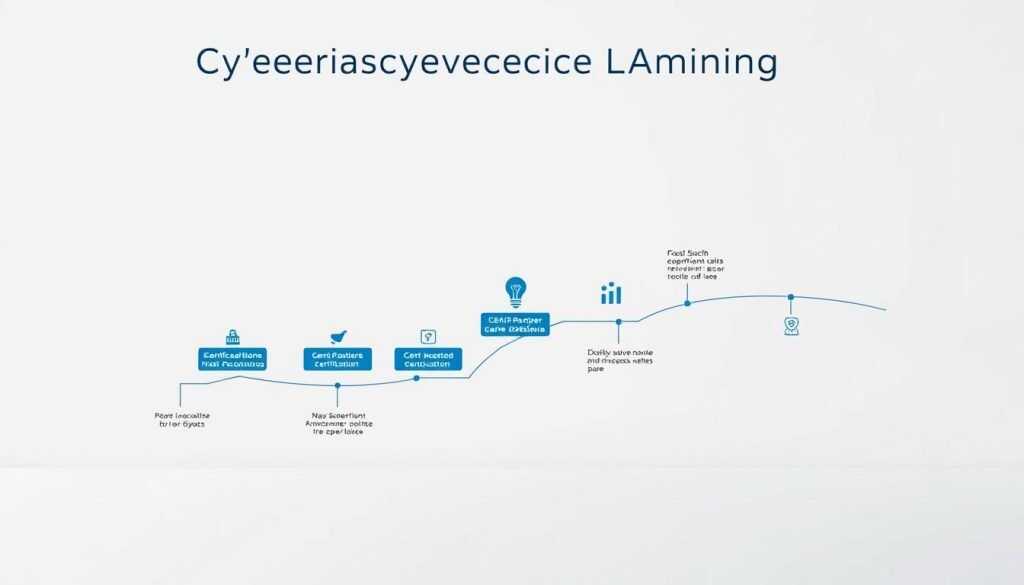How much does IT cost to get cyber security certification?
What if the single most powerful investment in your professional future is not a stock or a property, but a credential that validates your expertise? In an era where digital threats evolve daily, the demand for skilled security experts is skyrocketing. We understand that navigating the financial commitment for a certification can feel overwhelming.

This guide demystifies the complete financial landscape of cybersecurity credentials. The career path for professionals in this field is exceptionally bright, with job growth projected at 33 percent through 2033. This growth makes choosing the right credential a critical decision.
We break down the full cost structure, from exam fees to training and renewal expenses. Our goal is to provide clear, actionable information that empowers you to make a strategic investment in your professional development. This analysis helps you align your goals with the appropriate level of certification.
Key Takeaways
- Cybersecurity certification represents a strategic financial investment with a significant potential return.
- Total costs extend beyond the exam fee to include training, materials, and renewal fees.
- The cybersecurity job market is projected to grow by 33% between 2023 and 2033.
- Credentials validate expertise and are increasingly required by employers.
- Understanding the complete cost structure is essential for effective career planning.
- Different certification levels serve distinct career stages and professional objectives.
Introduction and Overview of Cyber Security Certification Costs
Navigating the financial landscape of professional credentials requires understanding both immediate investments and long-term career benefits. We approach this analysis with the perspective that informed decisions lead to optimal professional outcomes.
Understanding the Certification Landscape
The ecosystem of professional credentials spans multiple expertise levels. Foundational credentials validate core security concepts, while advanced designations demonstrate specialized technical proficiency.
Management-level certifications showcase leadership capabilities across complex security domains. Each tier serves distinct career stages and professional objectives.
| Certification Level | Example Credentials | Exam Cost Range | Annual Renewal Fees |
|---|---|---|---|
| Entry-Level | CompTIA Security+ | $425 | $45-$125 |
| Advanced | CISSP | $749 | $45-$125 |
| Expert | CISM | $575-$760 | $45-$125 |
Why Certification Costs Matter for Your Career
These financial commitments represent strategic investments that directly impact earning potential. The right credential can lead to substantial salary increases and eligibility for previously inaccessible roles.
Employers increasingly view certifications as essential qualifications rather than preferred additions. This makes the investment not merely educational but necessary for career advancement in this rapidly expanding field.
The Importance of Cyber Security Certifications in Today’s IT Landscape
As cyber threats grow increasingly sophisticated, validated expertise becomes the cornerstone of effective security strategies and professional credibility. We recognize that credentials serve as essential validation mechanisms in this rapidly evolving digital environment.
These qualifications demonstrate mastery of specialized technical competencies that organizations desperately need. The preparation process itself expands your security knowledge foundation substantially.
Enhancing Career Opportunities
Professional credentials directly expand job market access by making candidates eligible for positions requiring validated expertise. Many advanced roles explicitly prefer or mandate specific certifications.
This validation positions professionals for positions with greater responsibility and compensation. The right credential can unlock previously inaccessible career paths.
Building Credibility and Earning Potential
Certifications provide objective verification of capabilities beyond resumes and interviews alone. They signal to employers that you’ve passed rigorous standardized testing.
The financial returns are measurable, with certified professionals consistently commanding higher salaries. Prestigious credentials often correlate with significant salary increases.
| Certification Level | Career Advancement Impact | Typical Salary Increase | Employer Preference Rate |
|---|---|---|---|
| Entry-Level | Foundation for security roles | 10-15% | 65% |
| Intermediate | Specialist positions | 15-20% | 78% |
| Advanced | Leadership opportunities | 20-25%+ | 85% |
Organizations increasingly view certification investments as strategic necessities. Many employers cover costs recognizing that certified teams deliver stronger security postures.
How much does IT cost to get cyber security certification?
Professional validation in the digital protection field encompasses a spectrum of financial commitments that vary by credential type and preparation method. We analyze these investments to provide clear budgeting guidance for professionals at different career stages.

Entry-level credentials typically require $425-$999 for examination fees alone, with Systems Security Certified Practitioner costing $249 and GIAC Security Essentials reaching $999. These foundational credentials establish core competency validation for newcomers to the field.
Advanced designations demand higher investments, with Certified Ethical Hacker examinations priced between $950 and $1,199. The CISSP credential requires a $749 examination fee, representing intermediate career progression points.
Expert-level validation carries examination costs from $575 to $760 for credentials like Certified Information Security Manager. These premium credentials validate leadership capabilities and strategic security oversight.
Training expenses constitute another significant component, ranging from self-study materials to comprehensive programs. Boot camps typically cost $2,500-$17,000, while university-affiliated programs may reach $47,400 for complete degrees.
Ongoing maintenance includes annual renewal fees from $45 to $125, plus continuing education requirements. Understanding this complete cost structure enables strategic planning for your professional development journey.
Entry-Level Cyber Security Certifications and Their Costs
Foundational credentials open doors to security careers with minimal financial barriers, making professional validation accessible. We examine the most popular entry-level options that balance comprehensive coverage with reasonable investment.
These credentials validate essential knowledge and skills that employers seek for junior positions. Each offers distinct advantages for different career paths.
CompTIA Security+ and GSEC Essentials
The CompTIA Security+ certification stands as the industry’s most recognized entry-level credential. The SY0-701 exam costs $425 and covers 90 questions in 90 minutes.
This security credential validates core competencies across multiple domains. It requires a $50 annual renewal fee every three years.
The GSEC certification represents a more advanced entry point at $999. This exam includes 106-108 questions testing practical problem-solving capabilities.
(ISC)2 SSCP Overview
The Systems Security Certified Practitioner credential offers exceptional value at $249. This four-hour exam contains 150 questions covering eight security domains.
It focuses on administrative security tasks and operations within information systems. Annual renewal costs $125 with no additional expenses.
Training investments significantly enhance success rates for these credentials. Comprehensive course bundles provide lifetime access to practice materials and interactive labs.
Advanced Cyber Security Certifications: Value and Investment
Moving beyond foundational qualifications, elite designations unlock specialized career paths with substantial compensation advantages. We recognize these credentials as strategic investments that validate comprehensive expertise across complex security domains.
EC-Council Certified Ethical Hacker (CEH) and Beyond
The CEH certification validates ethical hacking methodologies through rigorous testing. This exam covers five crucial phases, from reconnaissance to maintaining access.
Professionals pursuing this path should budget $950-$1,199 for the exam fee. Required training programs range from $850 to $3,499, with some packages including the voucher.
Exploring (ISC)2 CISSP and CISA
The CISSP certification represents the premier credential in information security. It demands five years of professional experience across multiple domains.
This prestigious designation costs $749 for the comprehensive four-hour assessment. The CISA certification focuses on audit processes and risk management.
Both credentials require significant preparation time alongside financial investment. We advise careful evaluation of your career objectives before pursuing these advanced validations.
Certification Training Options: Courses, Boot Camps, and Online Programs
Selecting the optimal preparation path represents a critical decision that directly influences both your investment and ultimate success. We examine the distinct advantages of various training methodologies to help professionals align their learning preferences with effective preparation strategies.
Boot Camps vs. Self-Paced Online Courses
Cybersecurity bootcamps deliver intensive, structured learning experiences within compressed timeframes of 8-36 weeks. These programs typically cost $2,500-$17,800 and feature instructor-led sessions that accelerate skill development through hands-on labs.
Self-paced online courses provide maximum flexibility for working professionals, with comprehensive programs ranging from $5,000-$20,000. This approach offers lifetime access to course materials, allowing you to revisit challenging content as needed.
Vendor-Specific Training Insights
Specialized training focuses on particular security platforms that organizations deploy extensively. These technical courses range from $300-$3,500 per participant, with subscription models available at $3-$6 monthly per employee.
Training bundles present exceptional value by combining multiple courses covering penetration testing and threat hunting. These packages develop comprehensive knowledge while preparing candidates for multiple industry validations.
We recommend evaluating programs based on your learning style, schedule flexibility, and certification timeline. The right training approach dramatically increases exam success while ensuring practical skills translate directly to job performance.
Key Factors Influencing Certification Costs
Multiple financial components converge to create the complete picture of certification expenses, each requiring careful consideration. We recognize that understanding these interconnected elements enables better budgeting and strategic planning for your professional development journey.
The investment extends beyond the initial examination fee to encompass preparation resources and ongoing maintenance requirements. These factors collectively determine the true financial commitment for validating your expertise.
Exam Fees, Training Expenses, and Renewal Costs
Examination fees represent the most visible component, varying significantly by credential level and provider. Entry-level assessments typically range from $249 to $425, while advanced validations can reach $1,199 depending on the certifying body.
Training investments constitute the largest variable in overall expenses. Comprehensive programs range from self-study materials to intensive bootcamps costing $2,500 to $17,000. The depth of content and instructional quality directly influence pricing structures.
Provider reputation significantly impacts program costs, with established institutions commanding premium prices for their track records. Courses offering advanced software access and hands-on laboratory environments typically justify higher investments through superior learning outcomes.
Renewal requirements introduce recurring expenses that maintain credential validity over time. Annual fees range from $45 to $125, plus continuing education investments needed for recertification cycles. We advise evaluating these factors holistically when planning your certification pathway.
Navigating Exam Fees, Training Tools, and Renewal Expenses
Budgeting strategically for credential success involves mapping out the complete expense timeline from preparation through renewal cycles. We recognize that comprehensive financial planning prevents unexpected costs from disrupting your professional development journey.
Understanding Upfront and Recurring Costs
Initial investments extend beyond the core exam fee to include comprehensive training resources and application processing. These upfront expenses range from $99 for fundamental credentials to $999 for advanced validations.
Recurring obligations create ongoing financial commitments throughout your credential’s lifecycle. Annual renewal fees vary significantly across different certification bodies, requiring careful long-term budgeting.
| Certification Body | Renewal Frequency | Annual Cost | CPE Requirements |
|---|---|---|---|
| CompTIA | Every 3 years | $50 | 50 credits |
| (ISC)² | Annual | $125 | 40 credits |
| EC-Council | Annual | $80 | 120 credits |
| ISACA | Annual | $45-$85 | 20 credits |
| GIAC | Every 4 years | $469 | 36 credits |
Continuing education represents additional recurring expenses, as most credentials mandate specific credit accumulation. Many organizations cover these costs, with 40% offering employer-sponsored programs.
Strategic planning enables professionals to calculate total ownership costs over multiple years. This approach reveals the true financial commitment behind each credential.
Planning Your Cyber Security Career and Budget
Developing a strategic roadmap for your professional advancement requires aligning credential investments with specific career objectives and organizational needs. We approach this planning process as a collaborative exercise that balances ambition with practical constraints.

Choosing the Right Certification Based on Your Goals
Your current experience level serves as the foundation for selecting appropriate credentials. Entry-level professionals benefit from foundational validations like Security+ or SSCP, which establish core security knowledge.
Those with several years of experience should consider advanced designations that open specialist roles. Management-focused professionals require credentials validating governance and risk management capabilities.
| Career Stage | Recommended Credentials | Investment Range | Target Roles |
|---|---|---|---|
| Entry-Level (0-2 years) | Security+, SSCP | $250-$425 | Security Analyst, Technician |
| Intermediate (2-5 years) | CISSP, CEH, CISA | $3,000-$8,000 | Security Engineer, Auditor |
| Advanced (5+ years) | CISM, CRISC | $4,000-$6,000 | Security Manager, Director |
Strategic sequencing builds expertise progressively while maximizing return on investment. Each credential should leverage previous knowledge while adding specialized capabilities.
Contact us today for tailored guidance
We invite you to connect with our team for personalized roadmap development. Our experts help professionals and organizations navigate credential selection based on specific career objectives.
Visit https://opsiocloud.com/contact-us/ to schedule your consultation. We provide strategic guidance that aligns certification investments with long-term career success.
Conclusion
As organizations worldwide face increasingly sophisticated digital threats, the demand for certified security professionals continues to accelerate dramatically. We recognize that selecting the right credential pathway represents a strategic decision with profound implications for your career trajectory and organizational impact.
The comprehensive guidance we’ve provided illuminates the full spectrum of investment considerations, from foundational credentials to advanced designations. Validated expertise not only enhances individual skills but also strengthens organizational defenses against evolving attacks.
We encourage you to leverage this information when planning your professional development journey. Our team stands ready to provide personalized consultation that aligns your experience level with appropriate certifications, ensuring your investment delivers maximum value in today’s competitive security landscape.
FAQ
What is the typical price range for a foundational cybersecurity certification?
Foundational credentials like CompTIA Security+ generally involve an exam fee between 0 and 0. When you factor in self-study materials or a training program, the total investment often ranges from 0 to
FAQ
What is the typical price range for a foundational cybersecurity certification?
Foundational credentials like CompTIA Security+ generally involve an exam fee between $370 and $400. When you factor in self-study materials or a training program, the total investment often ranges from $500 to $1,500, depending on the learning path you select.
How do costs differ between entry-level and advanced certifications like the CISSP?
Advanced certifications represent a significant step up in investment. The CISSP exam fee is approximately $750, and comprehensive training programs or boot camps can cost several thousand dollars. This higher cost reflects the depth of knowledge and experience required for credentials that validate expertise in information systems security and risk management.
Are there recurring expenses after I earn my certification?
A> Yes, most certifications require maintenance. This involves paying annual maintenance fees, typically ranging from $50 to $150, and earning Continuing Professional Education (CPE) credits every three years to stay current with evolving threats and compliance standards, ensuring your credential remains active.
What is the value of a Certified Ethical Hacker (CEH) certification for a security professional?
The CEH credential is highly valued for roles focused on offensive security and penetration testing. It provides practical knowledge of hacker methodologies, which is crucial for conducting vulnerability assessments and strengthening an organization’s defenses against real-world attacks.
How can I reduce the overall cost of obtaining a certification?
To manage expenses, consider self-paced online courses over intensive boot camps, utilize free or open-source training content, and check if your employer offers a tuition reimbursement program. Solid self-study discipline can significantly lower your training costs.
Why is the CISSP considered a top credential for an information security manager?
The CISSP is a globally recognized standard that validates an individual’s technical skills and managerial expertise in security architecture and risk management. It demonstrates a comprehensive understanding of how to protect organizations, making it a key differentiator for leadership roles.
,500, depending on the learning path you select.
How do costs differ between entry-level and advanced certifications like the CISSP?
Advanced certifications represent a significant step up in investment. The CISSP exam fee is approximately 0, and comprehensive training programs or boot camps can cost several thousand dollars. This higher cost reflects the depth of knowledge and experience required for credentials that validate expertise in information systems security and risk management.
Are there recurring expenses after I earn my certification?
A> Yes, most certifications require maintenance. This involves paying annual maintenance fees, typically ranging from to 0, and earning Continuing Professional Education (CPE) credits every three years to stay current with evolving threats and compliance standards, ensuring your credential remains active.
What is the value of a Certified Ethical Hacker (CEH) certification for a security professional?
The CEH credential is highly valued for roles focused on offensive security and penetration testing. It provides practical knowledge of hacker methodologies, which is crucial for conducting vulnerability assessments and strengthening an organization’s defenses against real-world attacks.
How can I reduce the overall cost of obtaining a certification?
To manage expenses, consider self-paced online courses over intensive boot camps, utilize free or open-source training content, and check if your employer offers a tuition reimbursement program. Solid self-study discipline can significantly lower your training costs.
Why is the CISSP considered a top credential for an information security manager?
The CISSP is a globally recognized standard that validates an individual’s technical skills and managerial expertise in security architecture and risk management. It demonstrates a comprehensive understanding of how to protect organizations, making it a key differentiator for leadership roles.

